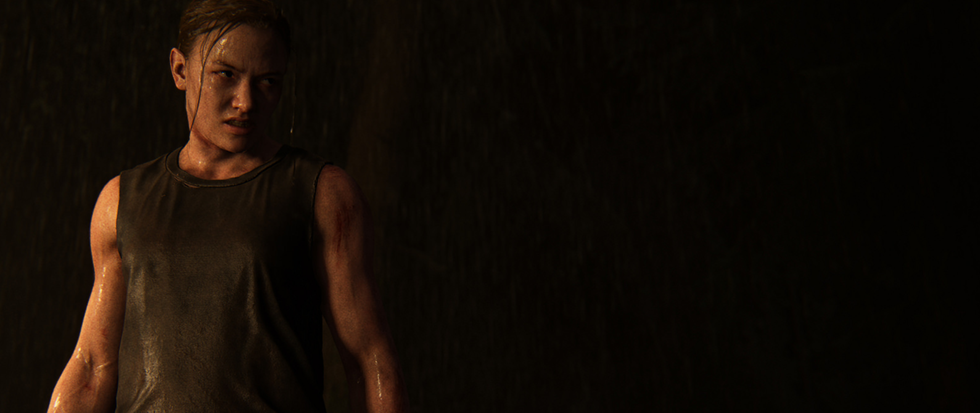
The Heart that Swings the Hammer: The Last of Us: Part II
Naughty Dog recently dropped a fresh scene for The Last of Us: Part II, and it’s a red band trailer in all but name. The single shot begins by arcing around a woman dragged, hanged, nearly gutted. Another woman has her arm smashed at the elbow while being pinned down, saved only by some well-trained arrows and a swing with the weapon that wounded her. In the end, the “demons” come running towards the hanged woman, now cut down and bearing that heavy, bloodied hammer, telling her saviors to watch their backs.
Our beloved internet reacted quickly, as it so often does, condemning the trailer as too savage, perhaps even borderline sadistic. Where was our beloved Ellie, reading corny jokes and dancing in the arcade? There’s no sign of her or papa Joel, strongly hinted to be living that ghost life now, offering no paternal protection. Creative Director Neil Druckmann strongly implies that this second chapter will primarily follow a different cast as well as the contrapuntal theme of “hate” to the original’s “love.” But as far as I can see, between the few bites we’ve been offered of Part II so far, the dark heart of the original game still violently pounds within this chapter.
I love The Last of Us, riddled with its warts. It’s a cruel game about the brutality of post-apocalyptic societal collapse, the golden-paved road to hell that is patriarchal power. It is a game of extreme, repetitive violence, bogged down with such in the service of the “game.” By the end both Joel and Ellie are serial killers, mass murderers acting primarily in self-defense but with little to no repercussions for their actions. The game sentences them and you as the player as such, setting up many obvious thunderdomes of intense combat that you cannot stealthily pass through as you might in other areas of the game. This obvious attempt to require my complicity with the violence was very distressing, because though I understood that these humans would take no such sympathy on me, the game painted such visceral scenes of gore and fury that I wanted to avoid them at all costs.
Even still, the longer I lived with Joel, the more obviously he embodied the patriarchy at its most toxic—frustratingly self-involved to an extreme, calloused to the world in the interest of pure survival, at which point one has to wonder why he even wanted to survive at all. I sympathize with his pain, and can’t remember crying at any game before The Last of Us like I did when Sarah and several others died. But throughout the game Joel is a poster for a false ideal of stubborn stoicism, as if it was emotion that threatened him the most, rather than zombie fungus. He cracks, and is worn down, but the nature of the video game means that he and I have killed a lot of people to get to the end, and I can’t forget it. It’s too easy to just forgive him, when he can’t even articulate why he should be absolved.
But The Last of Us lets us struggle with Joel’s broken manhood through several more satisfyingly nuanced women. Tess is equally scarred but unwilling to strip her humanity away as thoroughly as her smuggling buddy. Ellie is our emotional cypher with Joel, the father we love and hate through all his faults, learning from him but eventually protecting and growing beyond as well. Even Marlene, ultimately revealed to be less scrupulous in her motives, a flawed antagonist allowed to exist as she is, the rare butterfly of a woman allowed to be a complicated villain. These characters are the ones who refuse to succumb to a world literally built to consume them, where Joel and so many newly powerless men can’t help but mewl at the world.
So I’m not terribly surprised to find that The Last of Us: Part II trailer is stacked with diverse and potentially fascinating characters, and in whom I hold the most hope for the final game. A traitor picks up the hammer without hesitation to face down rushing clickers, rope burns glistening in the rain. A prisoner spits in the face of her tormentor, suffers a broken arm, but manages to de-brain the thug holding her down. She insists that her bow-sniper friend cut down the hanged woman, despite her questionable allegiance, presuming some greater sense of justice other than immediate self-preservation.
Granted, this is just a short trailer, but it doesn’t take much peeling to find implications that the final game will contain something more than non-stop slaughter. Just as it’s disingenuous to pretend the original game was more pure. I hold out hope that Part II will find precious moments of delight in the same quality of quiet moments as those found in The Last of Us, alongside the unflinching examination of humanity’s capacity for monstrosity.





